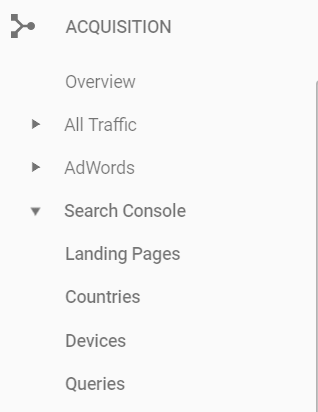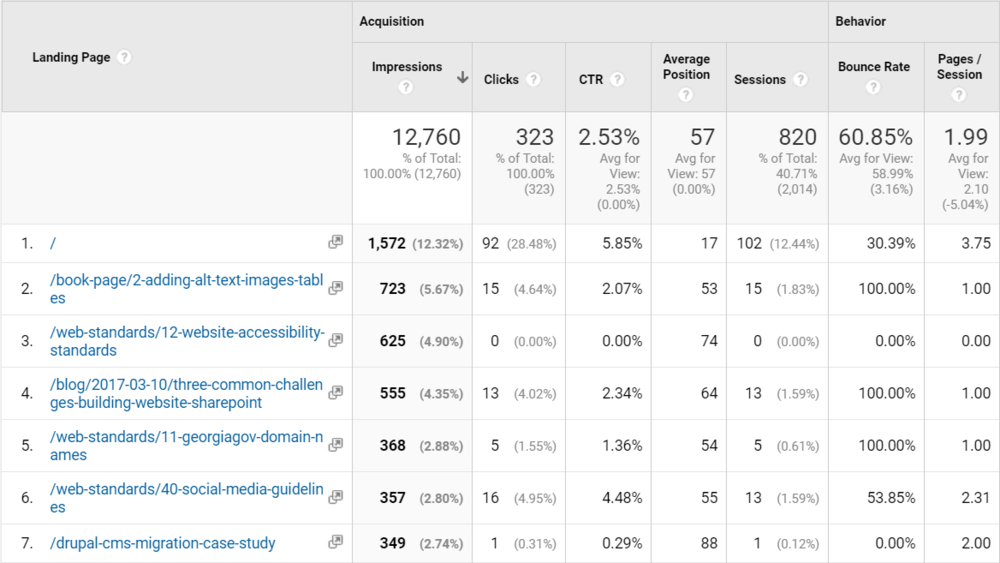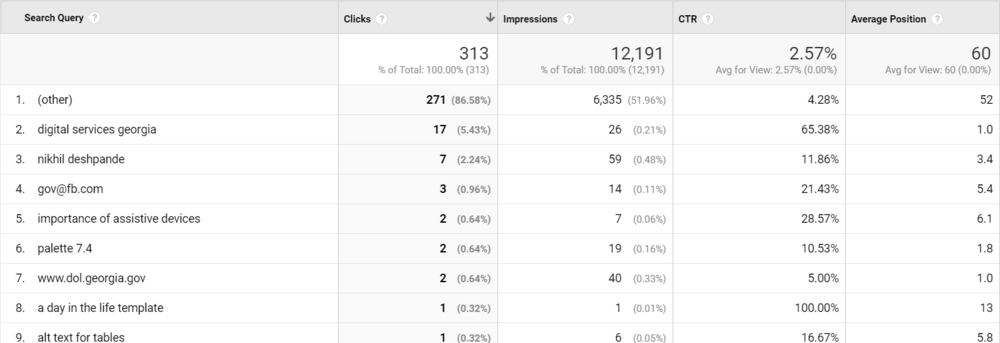
November 08, 2017
Getting Started With Google Search Console in Google Analytics

One of the most challenging tasks for any website is knowing how to best help users find the content they need as quickly as possible. Since we’re not able to ask what each individual is looking for, we rely on tools such as Google Search Console to provide valuable insights into user behavior.
Though Google Search Console has been around awhile now as one of Google’s Webmaster Tools, it has only recently been integrated into Google Analytics to provide more data about user engagement in one place. The integration is an optional, but worthwhile addition to understanding how users are getting to your website.
Google Search Console shows how users access your site content only from Google Search, including:
- Terms people are searching for (recorded as queries),
- Most popular content seen in Google Search results (recorded as impressions),
- Most popular content clicked on in Google Search results (recorded as clicks), and
- Type of device users search on, including mobile, desktop, and tablet.

Benefits of Google Search Console Integration With Google Analytics
Google Search Console results can inform your organization’s content and search engine optimization (SEO) strategy in many ways. Some major benefits include the ability to:
- Prioritize updates to popular content based on user interest
- Identify site content that you can optimize for better discoverability in Google Search results
- Produce new content and initiatives aligned with user goals
- Add keywords to your content that reflect user’s vocabulary
Landing Pages
For a real life example of how Google Search Console can benefit your organization, let’s examine the data for our Digital Services Georgia website. Here are the top landing pages from Google during October through November, 2017:

Google Search Console defines a landing page as: “The pages through which users entered your site.” So the list in Figure 2 shows what pages of our site people come to directly from Google Search.
We can see from the above that during October, the most common site pages appearing in Google Search results were:
People are finding our information about accessibility. Great!
However, successful content is not only seen in Google Search results, but it’s actually clicked on. In this list, we see that the homepage has the highest CTR (click-through-ratio), followed by our Social Media Guidelines.
So far, we generally deduce that users are seeing several results regarding accessibility in their search results, but aren’t quite interested in following up; however, they are interested in learning more about our Social Media Guidelines. Analyzing the Social Media guidelines results, we see that not only is there a higher-than-average CTR rate, the bounce rate is low. So users are exploring more of our content after viewing the Social Media Guidelines page, not immediately leaving the site.
After processing these results, we’ll want to:
- Ensure that our social media guidelines stay up-to-date
- Prioritize writing more content about how to use social media effectively, including blog posts and guidelines
- Investigate why accessibility content is appearing, but isn’t being read. We can look to keywords that users search with to see where we might use different terminology, and incorporate prominent queries into our page content and headers.
Search Queries
We can also learn what searches overall bring users to our site by examining Google Search Console queries.

Note that in Figure 3, the term (other) appears first in the search query results. Google Search protects the privacy of users who are browsing in private sessions, either logged into Google or in an incognito tab. These results are not available to Search Console, and unfortunately this does challenge our ability to fully understand user behavior.
However, we can see that the number of impressions, the CTR, and the ranking in Google Search results (average position) are all high for “Digital Services Georgia,” “Nikhil Deshpande,” and “[email protected].” While we’d expect the first two queries to perform well in Google, it’s interesting that users are finding our page on Becoming Verified on Facebook and Twitter by searching “gov@fb.” Taken into consideration with our earlier findings about the prominence of our Social Media Guidelines page, we can surmise that there is a strong interest among users regarding the topic of social media which we can use to help inform our content strategy.
Get Google Search Console
Are you a GeorgiaGov platform user interested in seeing your own website’s search data? If you would like to get Google Search Console integrated with your Google Analytics, please file a support ticket.
Additional Reading
Curious for more information regarding Google Search Console and its integration into Google Analytics? We consulted the following resources:
- How to Set up the Google Analytics- Search Console Integration + 3 Key SEO Benefits
- Search Console Reports in Google Analytics
